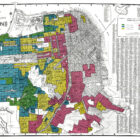Proposition C would change San Francisco’s tax policy to allow a one-time transfer tax exemption for owners of properties converted from commercial to residential use the first time they are sold following conversion, as long as the change of use is approved before Jan. 1, 2030.
Housing
San Francisco Rent Relief Tracker
More than one month after statewide eviction protections expired on June 30, less than 4% of rent relief funds requested by San Francisco households remain unprocessed, with 55% of funds paid out.
Housing
Tens of Thousands Vulnerable to Eviction as California Protections Poised to End
Roughly two years, multiple eviction moratoriums and over $3.6 billion in rent-relief payments after tenant advocates began worrying COVID-19 hardships would push thousands of renters out of their homes in San Francisco and elsewhere, California policy interventions aimed at preventing evictions are poised to end.
Barring an eleventh-hour postponement by lawmakers (not out of the question, given three previous last-minute extensions), California’s eviction protections expire June 30. Among those vulnerable to being forced from their homes are more than 135,000 tenants whose applications for rent relief have been denied, and thousands more whose applications may be denied in the future or not processed by the time protections are lifted.
California
Court Says California Utilities Commission Must Obey State Public Records Act
In a broad victory for government transparency, an appeals court has ruled that the California Public Utilities Commission must comply with a state law requiring all agencies to promptly release information to the public.
In a unanimous decision issued Friday, a three-judge panel of the 1st District Court of Appeal in San Francisco said the commission’s lengthy and open-ended administrative procedures violate the strict timelines of the California Public Records Act.
The ruling could bring more accountability to the commission, which has faced criticism of excessive secrecy and ineffectiveness, advocates said. It regulates corporations ranging from utilities to ride-hailing services.
Tax Cuts and Eroding Worker Protections Made Wealth Gap More Extreme
When we examine the massive wealth gap between the rich and poor in this country, what stands out most is how differently it affects the country’s white and Black populations.
According to data from the Federal Reserve Board’s Survey of Consumer Finances, the typical Black family has $24,000 in wealth. That is less than 13% of the $190,000 in wealth held by the typical white family.
How California Utilities Commission Undermines the Public Records Act
Despite vows to become more transparent, the California Public Utilities Commission has systematically violated the public’s right to know about its handling of deadly disasters and corporate scandals, according to court records and First Amendment attorneys.
Applying century-old laws meant to fight corruption, the commission has effectively limited court enforcement of the state’s public records act. But a state appeals court on May 3 is hearing a lawsuit challenging that practice and could bring more transparency to the commission.
America’s Wealth Gap Is Rooted in Racism. How Did We Get Here?
While the wealth gap continues to expand, much of it is grounded in discriminatory economic practices dating back to the early 20th century that made it difficult for members of racial minorities in the U.S. to accumulate wealth — or to keep what they were able to acquire.
Housing
California Bill Would Give Tenants 3-Month Eviction Reprieve — but Only to Those Who Act Fast
A bill introduced Thursday in the California Assembly would extend eviction protections by three months for tenants who have applied for emergency rent relief related to the coronavirus pandemic. The catch: To qualify, tenants who haven’t yet asked for help would need to submit applications by the end of March, giving them less than a week to get their requests in the queue.
Housing
SF Renters on Verge of Winning Collective Bargaining Rights
Groundbreaking tenant protections just got closer to becoming a reality in San Francisco.
City supervisors Monday gave the initial thumbs-up to legislation to protect the formation of tenant associations that, like unions, could collectively bargain with landlords. The three-person Rules Committee voted unanimously to approve the protections, which now move to the full Board of Supervisors.
Housing
Thousands in SF Saddled With Rent Debt but Ineligible for Government Help
Thousands of San Franciscans who borrowed money to pay rent during the pandemic are stuck with that debt, making them worse off than those who let the bills lapse.
Federal relief funds cover only unpaid housing expenses. That leaves tenants vulnerable if they made good-faith efforts to pay those costs by taking on thousands of dollars of debt to credit card companies, payday lenders, relatives or friends — especially if they later seek different housing.
Land use
State Report Links Redlining and Pollution Threats
San Francisco neighborhoods the federal government targeted with racist lending practices face the greatest health threats from pollution, a recent state study found. The California Environmental Protection Agency analyzed the latest pollution data in historically redlined neighborhoods, where people of color were denied mortgage loans under federal policies, in the report finalized in August.


















